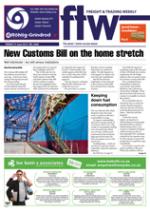Alan Peat and Joy Orlek
The Customs Bill skidded off
the political racetrack three
years ago – but it’s now back,
racing on the last lap towards
the chequered flag.
Or at least that’s the gist
of what Malcolm Hartwell,
master mariner and director of
international lawyers Norton
Rose Fulbright, told FTW.
“The SA Revenue Service
(Sars) has advised us that the
draft Customs Control Bill
and draft Customs Duty Bill
(which combine to replace
the previous legislation) have
been approved by the state law
office and have been submitted
to cabinet for their approval,”
he said. “Unfortunately, until
cabinet approves the bills, they
have no idea when they will be
submitted to parliament for
approval.
“They do, however, anticipate
that the bills will become acts
within the next year.”
Of course there is a chance
that they may be amended
before they are enacted, he
added. “It really depends on
what happens in cabinet and
once they get to parliament.”
But the downstream
implications of amendments
to the Customs Control Bill
have attracted fierce industry
reaction.
And while the impact of
acquitting cargo at the first port
of entry will clearly have serious
implications for the freight
industry, there are good reasons
for Customs’ revamp of the bill.
“It’s a complicated piece
of legislation to find your
way around,” said Andrew
Robinson, also a director at
Norton Rose Fulbright. “What
they have tried to do in the new
version is to simplify it so that it
flows better.”
The revised bill is also an
attempt by Sars to stamp out
customs fraud by importers
who have all sorts of schemes
involving delayed payment of
duties – often for cash flow
purposes.
“Under the current
regime, an importer in
Johannesburg can bring cargo
through Durban in bond to
Johannesburg where it can
remain in a bonded warehouse
until he chooses to clear it,”
Hartwell told FTW. And that’s
a benefit for the importer since
it’s often cheaper to pay for the
storage than to acquit the cargo
immediately.
Cross-border cargo has also
posed a problem in the past.
With most southern African
imports historically flowing
through South Africa in bond,
round-tripping – where cargo
never leaves the country and
avoids the payment of duty
altogether – has been an
ongoing problem.
“The bill is designed to
circumvent customs fraud
entirely,” said Hartwell. And
the benefits to Sars of duty
payment at first port of entry
are self-evident.
But a lot of companies are
based in Johannesburg and
want their clearing done in
Johannesburg, he added. And
from an inspections point of
view, the general rule is that
you inspect where you clear.
In addition, there’s a
whole industry dealing with
clearance of goods through
customs in Johannesburg
whose livelihoods are at risk.
And as Pat Corbin of the JCCI
has pointed out time and time
again, the bill in its current
format would shut down City
Deep and jeopardise Transnet
Freight Rail’s attempts to
grow its general freight
business.
Everything now hinges
upon which way this dice falls
when the bill goes through
its parliamentary finalisation
stages.
So while the amended bill
may be well intentioned – the
practical impact has clearly
not been adequately explored.
INSERT & CAPTION
They’ve tried to
simplify the new
version it so that it
flows better.
– Andrew Robinson

